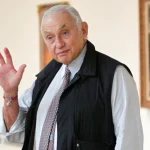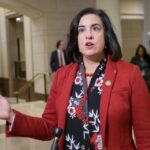
–>
August 14, 2022
Mahmoud Abbas, president of the Palestinian Authority, is 86 years old. Against all odds, Abbas has been able to control the PLO and the Palestinian Authority with an iron fist. To this day, he remains “El kol fil kol,” an Arabic term for a man in control of everything. Nonetheless, Abbas’s health has been failing more rapidly lately.
‘); googletag.cmd.push(function () { googletag.display(‘div-gpt-ad-1609268089992-0’); }); }
In addition, Abbas’s demeanor has changed. He seems distant from the Palestinian Authority areas. He spends most of his time in Amman, Jordan, under the pretext of receiving medical treatment.
Abbas is on his last legs. Yet he is not preparing any of his sons to be his successor, not even his well educated millionaire businessman son, Mazen, who is also a Canadian citizen.
So the question is, who will replace him?
‘); googletag.cmd.push(function () { googletag.display(‘div-gpt-ad-1609270365559-0’); }); }
A number of names come to mind, but there is no one who is a natural, who would command the support of the power brokers or the Palestinians.
The Palestinian Authority has been cautiously promoting one guy, Hussein Al-Sheikh, secretary general of the Executive Committee of the PLO. He has been described by many area media outlets as “the next Palestinian president.” Since his appointment by Mahmoud Abbas last May, Al-Sheikh has been making grand statements, a big no-no in the PLO code of ethics unless commissioned by Abbas himself. In other words, it is not unlikely that Abbas is preparing him to be his successor. Nevertheless, the man has no public support, is not known to many Palestinian and does not have the usual struggle credentials necessary to move up the ladder in the PLO. For example, he did not fight with Arafat in Beirut.
At the same time, the 62-year-old Al-Sheikh is no match for those in Abbas’s inner circle. Though they are in their mid-seventies to mid-eighties, they enjoy more popularity and influence. Even worse, the Palestinian old guard are already accusing Al-Sheikh of being “an Israeli agent whom the Zionists want to install after Abbas dies.” With such obstacles, it is likely that Al-Sheikh couldn’t succeed Abbas without facing severe opposition from PLO dinosaurs who could easily organize a coup against him, or even worse.
Another possibility to succeed Abbas as the leader is General Majid Farraj, the head of Palestinian Intelligence. Farraj comes from the Dhuyshah refugee camp in Bethlehem, which makes him closer to the average Palestinian than most P.A. leaders, who arrived there from Tunisia or Lebanon. Farraj enjoys a reputation for fighting terrorism, including that coming from the PLO itself. Farraj has been running the Palestinian Intelligence effectively, keeping its use of violent means against the Palestinian opposition to the “necessary” minimum.
In addition, Farraj has extensive experience in fighting terror in cooperation with Mossad; the CIA, which trains his men to this day; and the British Secret Intelligence Service (MI6). This has materialized in his breakthrough operation in which the Palestinian intelligence helped the CIA locate and arrest a fugitive Libyan terrorist, Abu Annas Al-Libya, in his hometown in Libya.
Farraj would make an effective, decent, and capable president to the P.A., but there is a problem: the P.A.’s strongmen fear Farraj’s effectiveness, and his proximity to the Americans would make him “too strong of a president for them.” Also, Farraj is relatively young, in his 50s, which does not bode well with the P.A.’s/PLO’s old guard. They believe they have more merit to lead the P.A., and they are capable of causing trouble to Farraj once he is in power. “Trouble” could mean launching and financing another intifada to make him look weak or force him to step down. They can do that if they want to.
‘); googletag.cmd.push(function () { googletag.display(‘div-gpt-ad-1609268078422-0’); }); } if (publir_show_ads) { document.write(“
Another candidate who comes to mind is Jibril Rajoub, the former head of the Palestinian FBI, the Preventive Security Force, and a member of the PLO’s Central Committee. Rajoub comes from Hebron and enjoys the support of its clans, and that is exactly his problem: Palestinians generally view Rajoub as serving only Hebron’s Arabs and not leaving room for outsiders to gain any form of influence. This allegation rings true for Rajoub; he rarely hires anyone outside his native area, Hebron, and all of those around him who have benefited from his influence were from Hebron, too.
That’s not his biggest problem though. When he was head of the Palestinian Preventative Security Office, he was known for corruption, bullying, and racketeering. His associates terrorized, blackmailed, jailed, and physically tortured anyone who stood against them. This has turned Rajoub into a man generally hated by the Palestinians. He enjoys serious influence within the P.A. and PLO because of his Hebron-tribal lobby, but the general P.A. residents may never accept him. He is hated by the P.A. heavyweights, and he will never be able to control them or their militants.
Mohammad Dahlan is a strong candidate. He had served as Arafat’s security chief and remains influential to this day. Nonetheless, his feud with Abbas and the rest of the P.A. makes him their enemy, and it is very unlikely they would ever tolerate him as the next P.A. president. Besides, they have accused him of “poisoning” Arafat.
Other names such as Abbas Zaki, Salam Fayyad, Ahmad Qurai, Nabil Shaath, and Nasser Al Qudwa, Arafat’s nephew, come to mind, but none of them has the power, influence, muscle, or popularity to keep the P.A. intact.
When Abbas goes, since there is no acceptable heir apparent, chaos will ensue. The P.A. areas will fall into disarray. Hamas will to try to infiltrate the West Bank further, as it has been doing slowly but surely.
To avoid such an outcome, Israel will have to take full control of Oslo-delineated Areas A, B and C. That will mean the end of the Palestinian Authority.
The Palestinian public openly prefer the quality of life Israel offered to the West Bank before Oslo. They will take this any day over the corrupt P.A. This is what their leaders, tribal figures, intellectuals, and even students have told us in lengthy interviews. Still, Israel may not want to take back the burden of handling Palestinian territories like Ramallah, Jenin, and Tukaram..
Change is in the air. The Abraham Accords have ushered in a new era of peace and cooperation. There is now talk of confederating Jordan with Areas A, B, and C at least. The plan to do so was first announced in Al-Arabiya news — owned by the Saudi royal family — on 8 June 2022 in an article written by Ali Shihabi — a close confidant of Crown Prince Mohammed bin Salman.
But this plan received short shrift from the UNSC after its 26th July Quarterly Open Debate, “The situation in the Middle East, including the Palestinian question,” proceeded for five hours without any speaker making reference to this idea.
But that doesn’t mean the end of the idea. It just means that the United Nations has made itself irrelevant.
There is nothing to stop Jordan from pursuing the idea of confederation and replacing the Palestinian Authority.
Ted Belman is the editor of Israpundit.
Mudar Adnan Zahran is the secretary general of the Jordan Opposition Coalition and a Palestinian leader.

Image via Max Pixel.
<!– if(page_width_onload <= 479) { document.write("
“); googletag.cmd.push(function() { googletag.display(‘div-gpt-ad-1345489840937-4’); }); } –> If you experience technical problems, please write to [email protected]
FOLLOW US ON
<!–
–>
<!– _qoptions={ qacct:”p-9bKF-NgTuSFM6″ }; ![]() –> <!—-> <!– var addthis_share = { email_template: “new_template” } –>
–> <!—-> <!– var addthis_share = { email_template: “new_template” } –>







